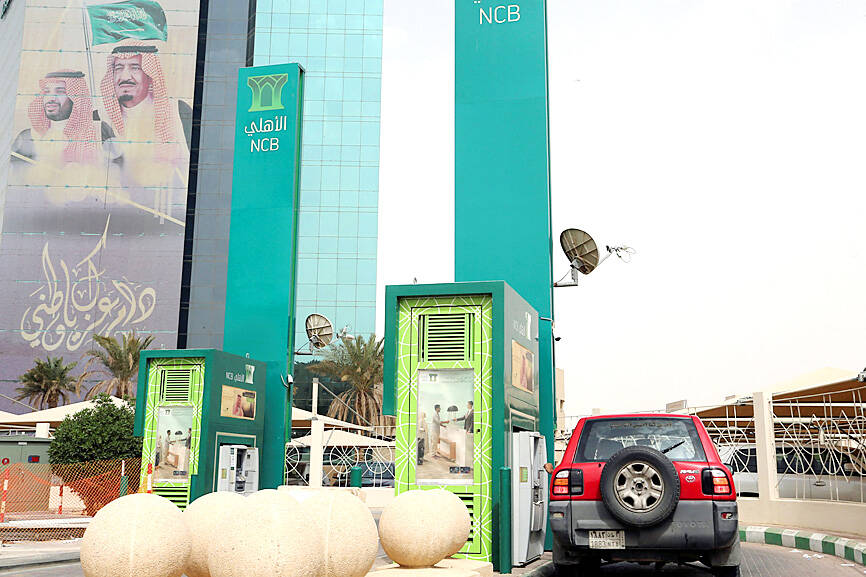The chairman of Saudi National Bank (SNB), which was the main shareholder of troubled lender Credit Suisse Group AG before its buyout this month, has resigned, a statement said yesterday.
SNB’s board of directors “accepted the resignation” of Ammar AlKhudairy “due to personal reasons,” said the statement published on the Saudi Stock Exchange.
Credit Suisse’s shares plummeted on March 15 after AlKhudairy said the Saudi Arabian bank would not raise its stake from 9.8 percent due to regulatory constraints.

Photo: Reuters
The following day, Credit Suisse rallied on the stock market after obtaining a US$54 billion central bank lifeline in a bid to restore investor confidence.
However, fears about the health of the broader financial sector led to its takeover by domestic rival UBS Group AG on Sunday last week.
In the aftermath of his comments, AlKhudairy tried to minimize what he described as a “panic.”
“If you look at how the entire banking sector has dropped, unfortunately, a lot of people were just looking for excuses,” he told CNBC television.
“It’s panic, a little bit of panic. I believe completely unwarranted, whether it be for Credit Suisse or for the entire market,” he said.
The Wall Street Journal last week reported that Saudi National Bank’s US$1.5 billion investment in Credit Suisse was made at the behest of the kingdom’s de facto ruler, Crown Prince Mohammad bin Salman.
It said that some officials at the Saudi Arabian sovereign wealth fund thought the move “was too risky... raising legal issues and the potential for large future losses.”
In an interview following AlKhudairy’s comments, Saudi Minister of Finance Mohammed al-Jadaan did not comment on specific financial institutions, but said that “multiple failures” including on the regulatory front had fueled troubles in the banking sector — “whether it is supervisory, whether it is management, whether it is concentration, whether it is mismatch of asset liability.”
He added that he did not believe those risks applied to Saudi Arabia.
“Just focusing on Saudi, you will go back to history, and you will hear a lot of comments that the two regulators in Saudi Arabia are quite conservative, and that’s what we then benefit from in a situation of distress,” he said.
A media report on Sunday said that the Swiss Financial Market Supervisory Authority (FINMA) was probing how to hold bosses at Credit Suisse accountable following its emergency takeover by UBS.
“We are not a penal authority, but we are exploring the corresponding possibilities,” FINMA Chairwoman Marlene Amstad was quoted as saying in an interview with NZZ am Sonntag weekly.
Saeed Mohammad al-Ghamdi, who had been serving as SNB’s CEO, is to replace AlKhudairy as chairman, yesterday’s statement said.
Talal Ahmed al-Khereiji has been appointed acting CEO, it added.

CAUTIOUS RECOVERY: While the manufacturing sector returned to growth amid the US-China trade truce, firms remain wary as uncertainty clouds the outlook, the CIER said The local manufacturing sector returned to expansion last month, as the official purchasing managers’ index (PMI) rose 2.1 points to 51.0, driven by a temporary easing in US-China trade tensions, the Chung-Hua Institution for Economic Research (CIER, 中華經濟研究院) said yesterday. The PMI gauges the health of the manufacturing industry, with readings above 50 indicating expansion and those below 50 signaling contraction. “Firms are not as pessimistic as they were in April, but they remain far from optimistic,” CIER president Lien Hsien-ming (連賢明) said at a news conference. The full impact of US tariff decisions is unlikely to become clear until later this month

Popular vape brands such as Geek Bar might get more expensive in the US — if you can find them at all. Shipments of vapes from China to the US ground to a near halt last month from a year ago, official data showed, hit by US President Donald Trump’s tariffs and a crackdown on unauthorized e-cigarettes in the world’s biggest market for smoking alternatives. That includes Geek Bar, a brand of flavored vapes that is not authorized to sell in the US, but which had been widely available due to porous import controls. One retailer, who asked not to be named, because

CHIP DUTIES: TSMC said it voiced its concerns to Washington about tariffs, telling the US commerce department that it wants ‘fair treatment’ to protect its competitiveness Taiwan Semiconductor Manufacturing Co (TSMC, 台積電) yesterday reiterated robust business prospects for this year as strong artificial intelligence (AI) chip demand from Nvidia Corp and other customers would absorb the impacts of US tariffs. “The impact of tariffs would be indirect, as the custom tax is the importers’ responsibility, not the exporters,” TSMC chairman and chief executive officer C.C. Wei (魏哲家) said at the chipmaker’s annual shareholders’ meeting in Hsinchu City. TSMC’s business could be affected if people become reluctant to buy electronics due to inflated prices, Wei said. In addition, the chipmaker has voiced its concern to the US Department of Commerce

STILL LOADED: Last year’s richest person, Quanta Computer Inc chairman Barry Lam, dropped to second place despite an 8 percent increase in his wealth to US$12.6 billion Staff writer, with CNA Daniel Tsai (蔡明忠) and Richard Tsai (蔡明興), the brothers who run Fubon Group (富邦集團), topped the Forbes list of Taiwan’s 50 richest people this year, released on Wednesday in New York. The magazine said that a stronger New Taiwan dollar pushed the combined wealth of Taiwan’s 50 richest people up 13 percent, from US$174 billion to US$197 billion, with 36 of the people on the list seeing their wealth increase. That came as Taiwan’s economy grew 4.6 percent last year, its fastest pace in three years, driven by the strong performance of the semiconductor industry, the magazine said. The Tsai